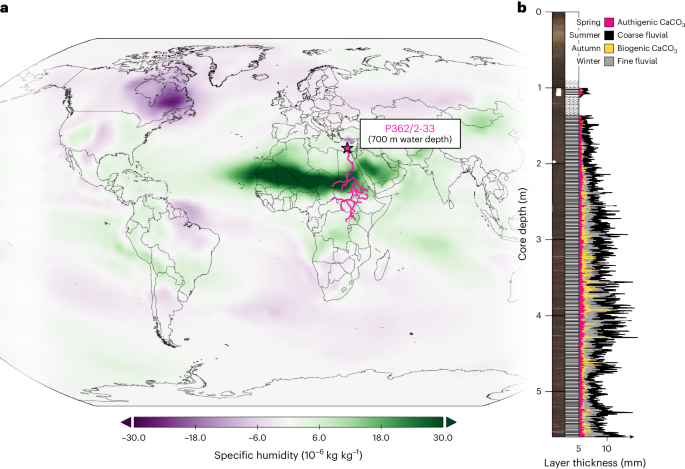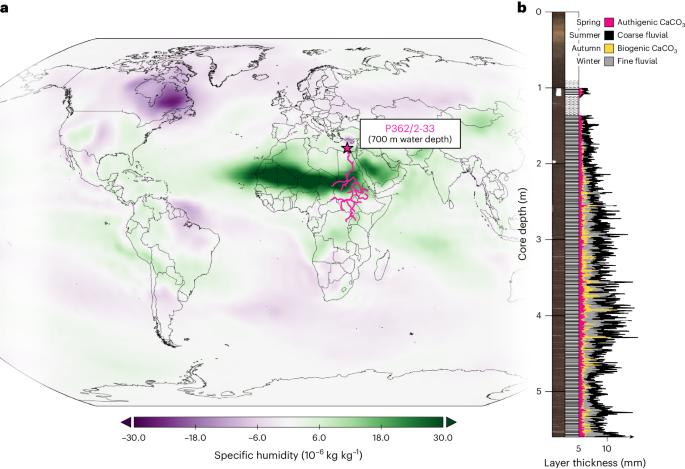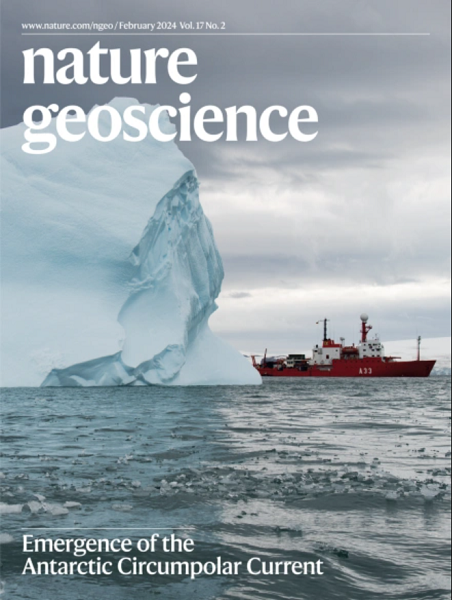Climatic pacing of extreme Nile floods during the North African Humid Period
IF 15.7
1区 地球科学
Q1 GEOSCIENCES, MULTIDISCIPLINARY
引用次数: 0
Abstract
Understanding how large river systems will respond to an invigorated hydrological cycle as simulated under higher global temperatures is a pressing issue. Insights can be gained from studying past wetter-than-present intervals, such as the North African Humid Period during the early Holocene Epoch (~11–6 thousand years ago). Here we present a 1,500-year-long annually laminated (varved) offshore sediment record that tracks the seasonal discharge of the Nile River during the North African Humid Period. The record reveals mobilization of large amounts of sediments during strong summer floods that may have rendered the Nile valley uninhabitable. More frequent and rapid transitions between extremely strong and weak floods between 9.2 and 8.6 thousand years ago indicate highly instable fluvial dynamics. Climate simulations suggest flood variability was paced by El Niño/Southern Oscillation on interannual timescales, while multi-decadal oscillatory modes drove changes in extreme flood events. These pacemakers have also been identified in the Nile flow records from the Common Era, which implies their stationarity under contrasting hydroclimatic conditions. Extreme and highly variable summer floods in the Nile River valley through the North African Humid Period were modulated by both interannual and multi-decadal climate modes, according to an offshore sedimentary archive.


北非潮湿期尼罗河特大洪水的气候步调
了解大型河流系统将如何应对在全球气温升高的情况下模拟出的活跃水文循环是一个紧迫的问题。通过研究过去比现在更潮湿的时期,例如全新世早期(约 1.1-6 千年前)的北非潮湿期,可以获得一些启示。在此,我们展示了长达 1500 年的年层状(变异)近海沉积物记录,该记录追踪了北非潮湿期尼罗河的季节性排水量。该记录揭示了夏季强洪水期间大量沉积物的移动,这些洪水可能导致尼罗河流域无法居住。距今 920 至 860 万年前,极强洪水和弱洪水之间的转换更加频繁和迅速,这表明河川动态极不稳定。气候模拟表明,洪水的变化在年际时间尺度上受厄尔尼诺/南方涛动的影响,而多年涛动模式则推动了极端洪水事件的变化。在公元纪的尼罗河水流记录中也发现了这些起搏器,这意味着它们在截然不同的水文气候条件下是静止的。
本文章由计算机程序翻译,如有差异,请以英文原文为准。
求助全文
约1分钟内获得全文
求助全文
来源期刊

Nature Geoscience
地学-地球科学综合
CiteScore
26.70
自引率
1.60%
发文量
187
审稿时长
3.3 months
期刊介绍:
Nature Geoscience is a monthly interdisciplinary journal that gathers top-tier research spanning Earth Sciences and related fields.
The journal covers all geoscience disciplines, including fieldwork, modeling, and theoretical studies.
Topics include atmospheric science, biogeochemistry, climate science, geobiology, geochemistry, geoinformatics, remote sensing, geology, geomagnetism, paleomagnetism, geomorphology, geophysics, glaciology, hydrology, limnology, mineralogy, oceanography, paleontology, paleoclimatology, paleoceanography, petrology, planetary science, seismology, space physics, tectonics, and volcanology.
Nature Geoscience upholds its commitment to publishing significant, high-quality Earth Sciences research through fair, rapid, and rigorous peer review, overseen by a team of full-time professional editors.
 求助内容:
求助内容: 应助结果提醒方式:
应助结果提醒方式:


